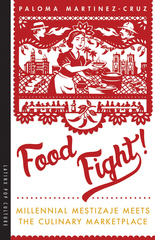
México Between Feast and Famine
Food, Corporate Power, and Inequality
As the birthplace of maize and a celebrated culinary destination, Mexico stands at the crossroads of gastronomic richness and stark social disparities. In México Between Feast and Famine Enrique C. Ochoa unveils the historical and contemporary forces behind Mexico’s polarized food systems.
México Between Feast and Famine provides one of the first comprehensive analyses of Mexico’s food systems and how they reflect the contradictions and inequalities at the heart of Mexico. Ochoa examines the historical roots and contemporary manifestations of neoliberal policies that have reshaped food production, distribution, and consumption in Mexico. Ochoa analyzes the histories of Mexico’s mega food companies, including GRUMA, Bimbo, Oxxo, Aurrera/Walmex, and reveals how corporations have captured the food system at the same time that diet-related diseases have soared. The author not only examines the economic and political dimensions of food production but also interrogates the social and cultural impacts.
As debates around food sovereignty, globalization, and sustainable development intensify globally, México Between Feast and Famine provides a timely analysis that counters conventional narratives about Mexican cuisine. Even as it looks back, this work looks to the future, where more equitable and sustainable food systems prioritize social justice and community well-being.
In this critical and thought-provoking study, Enrique Ochoa explores the historical roots of the current paradox that dominates Mexico’s food systems: a rich, diverse, and world-renowned cuisine and a majority of the population suffering chronic malnutrition and diet-related illnesses. This study outlines a long history of how colonialism and capitalism captured Mexican food systems—and of the resistance from below that seeks to take them back.’—Alexander Aviña, author of Specters of Revolution: Peasant Guerrillas in the Cold War Mexican Countryside
‘México Between Feast and Famine provides a detailed analysis of how food production and policy have changed in Mexico, particularly due to neoliberalism. It is an essential book to understand current-day Mexico, as it shows how the Mexican government favored the growth of particular industries and delegated them the responsibility of feeding the country. Through detailed case study analysis, this book reveals the industrial success of companies like Bimbo and Maseca at the expense of the Mexican population, who are losing their health and culinary culture.’—Sandra Aguilar-Rodriguez, Moravian University









